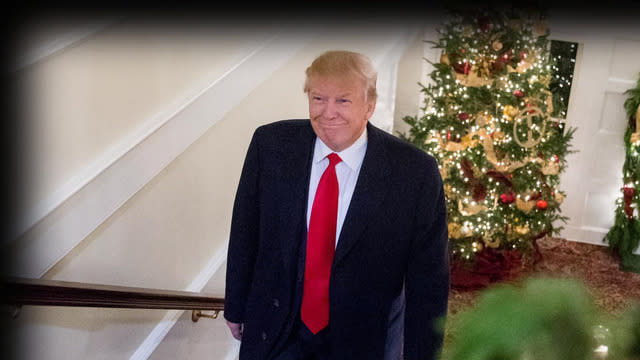Is it Time For Late-Night TV to Stop Joking About Donald Trump?

On Thursday night’s Late Night with Seth Meyers, Hillary Clinton stopped the laughter from the audience provoked by the host’s mere mention of Donald Trump’s name. “You know, I have to say, Seth, I no longer think he’s funny,” said Clinton, in a reference to Trump’s call to bar Muslims from entering the country.
“I think for weeks you, and everybody else, were just bringing folks to hysterical laughter, but now he has gone way over the line,” said the Democratic front-runner. “And what he is saying now is not only shameful and wrong, it is dangerous.”
Meyers, to his credit — or perhaps knowing this was coming, from a producer’s pre-interview — nimbly broadened the discussion to talk about the Presidential race in general, but the challenge had been laid down. When, if ever, is it time to stop joking about someone?
The standard argument goes that comedians level criticism by ridicule. Thus, if you believe Trump’s comments about Muslims are offensive, you could think that one way to reduce the power of those comments is by making fun of them, mercilessly scoffing at them, and, more broadly, at the man himself.
But if you take Clinton’s point, there’s also something to be said for the notion that if a candidate says something that not only sounds foolish but “dangerous,” the late-night platoon of jokers are only helping Trump’s cause by treating him as a mere figure of fun.
Of course you have to factor into this that Clinton is speaking as someone who must consider Trump a rival, and is therefore partisan in a number of senses. But she also articulates something that other citizens are feeling about Trump: That his continued prominence in Republican polls grants him a seriousness that transcends all the standard Trump tropes — his hair, The Celebrity Apprentice, his blustery way of talking that’s parodied on SNL and by Jimmy Fallon’s impersonation of him.
The first host to directly confront the new seriousness about Trump will be Jimmy Kimmel, who will host the candidate next Wednesday, the day after CNN’s Republican debate. Always remember that Kimmel’s professed idol is David Letterman — and I would guess that, were Letterman still on the air, he’d at least try to have a serious discussion with Trump, and perhaps express outright disagreement with some of Trump’s statements.
So far, however, Kimmel has not picked up on that aspect of Letterman’s personality — Kimmel doesn’t have the Midwestern-decency/populist-political gene that is bred into Letterman. And besides, confronting Trump directly is exceedingly difficult to do, because the candidate can out-talk anyone, as he proved against even so formidable a talker as Bill O’Reilly found when he had Trump on for two segments earlier this week on The O’Reilly Factor.
In any case, both Tuesday’s CNN debate, and Kimmel’s Wednesday night show, will be interesting to see, because they’ll probably further the next step in a new debate, one that TV producers might call, “How Do You Solve a Problem Like Donald Trump?”
The Republican debate will air Tuesday night at 8 p.m. on CNN. Donald Trump is scheduled to appear on Jimmy Kimmel Live Wednesday night at 11:35 p.m. on ABC.


